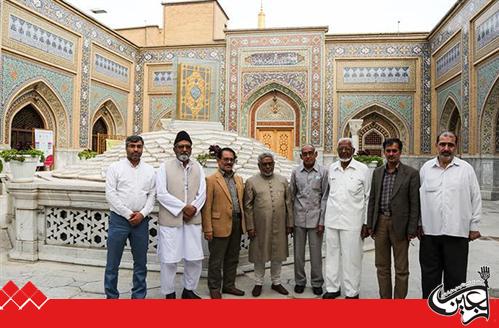On the sideline of his visitation from Astan Quds Razavi’s central library, professor Akhtar al-Wāse‘stated, “Many books in both living and ancient languages of the world are kept at foreign language hall of this library which all represent the grandeur of this library”. Al-Wāse‘ was visiting the Razavi Shrine in a four-person group.
He said, “This library belongs to all human societies and it does not belong to a specific nation or religion. Book lovers from different nationalities can take the advantage of this center’s sources and services as numerous rich sources in three languages of Persian, Arabic, and Urdu, some main languages of the Muslims, are available in this center”.
This Indian Islam researcher added, “Different places of this library including halls and treasuries have been decorated with Qur’anic verses and Islamic traditions which have all added to the spirituality and holiness of the library in the vicinity of Razavi Illuminated Shrine. Also, the spiritual atmosphere of the library leads to the calmness of the clients and researchers”.
Referring to the old history of this holy organization’s library and its increasing qualitative and quantitative growth after the victory of the Islamic Revolution, he continued, “Representation of Iranian and Islamic architecture and art in the building of this library are really unique”.
Akhtar al-Wase reiterated, “Formation of scientific and cultural centers affiliated to Razavi Shrine has changed it into a scientific, educational and research center”.
Appreciating this endowed center for its great services in the area of maintaining old manuscripts of the Islamic world and for protecting source books of prominent Muslim intellectuals, he said, “Astan Quds Razavi’s central library is a great blessing for both pilgrims and citizens of Mashhad and it will be a show of ingratitude if they do not use it”.
A Place Beyond a Museum
President of Maulana Azad University of Jodhpur and his delegation who were visiting history museum of the Razavi Shrine said, “The glory and grandeur of this center’s objects are to the extent that a word other than museum has to be used for describing it”.
He described this museum’s objects as illuminated objects and added, “All these historical and artistic objects show love and affection of people toward Imam Reza (A.S.) during history of Islamic world”.
Referring to the developments in Razavi Holy Shrine after the Safavid era, Akhtar al-Wāse‘ said, “Variety of objects in treasuries of Astan Quds Razavi’s central library and also existence of exquisite antiques from various historical eras are all very unique”.
He reminded, “Razavi Holy Shrine has expanded many times after the victory of the Islamic Revolution and all services offered to large congregation of Razavi visitors are really notable and admirable”
An Indefinable Emotion
In continuation of this visitation, another member of this group who has the experience of visiting over forty countries and also many famous libraries of the world said, “All the services and technologies of Astan Quds Razavi’s central libraries which are used to serve people and to maintain books are fantastic and update in a way that they keep library in the very first positions in the world”.
Shabīr Ahmad emphasized that this is his first visit to Iran. He also said, “I have always had the dream to visit Imam Reza’s (A.S.) Holy Shrine for at least one time and this dream came into reality today and I reached to my old desire”.
This Indian merchant and benefactor who is one of the earliest founders of Maulana Azad University in India, continued, “The moment I entered Razavi Shrine and saw its golden dome, I had a very special feeling which cannot be described”.
He added, “My feeling here is the same as that of mine in the Al-Masjid an-Nabawī (Prophet's Mosque) and the Great Mosque since Imam Reza (A.S.) is Prophet Mohammad’s (S.A.W.) dear one”.
Shabbir Ahmad stressed, “This University is located in India’s Rajasthan in which Farsi language was prevalent in the past. It is also our endeavor to revive Farsi in western India, launching new major of Farsi language”.
He noted that he has visited Tehran, Qom, and Gorgan in this travel to Iran. He also said, “I witnessed increasing growth and development of Iranians in different areas which have been attained, after victory of Islamic Revolution, despite of numerous sanctions imposed on the Islamic Republic of Iran.
Friday 20 February 2026

